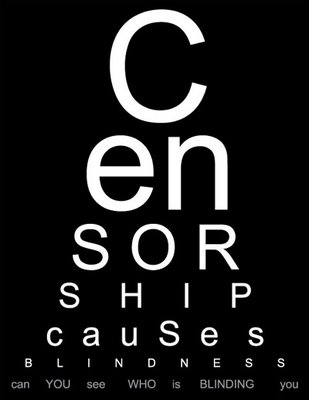Censorship in general is prohibiting ones freedom of speech in order to impose their own values. This includes stifling vocal, written, and physical actions of a person. Every place with literature that oppose other people's ideals experience some sort of censorship. The result of censorship is where other people change the author's works to impose their ideals on the author's work, which usually causes argument and discord. Content that includes, violence, sex, conflicting ideas, and inappropriate language. This is shown throughout various countries with repressive governments including, Russia, Iran, Nazi Germany, Egypt, and Cuba. They exercise censorship through extreme methods such as burning books. Overall, the cause of censorship is summed up by the philosopher, Sir Francis Bacon's quote, "Knowledge is power", which means people have a fear of knowledge.
 |
| Repressive government (Taliban) burns books |
Good thing we have the first amendment, which allows freedom of speech in any form right? Well, not exactly, America experiences these problems too, but in different ways. A book that has been challenged in the past is Huckleberry Finn. Critics claim that the use of the N-word is vulgar and takes from the work as a whole. The updated or more friendly version of the book replace the N-word with the word slave. The change of Twain's masterpiece not only violates his work, but it also doesn't capture the region in the specific time. At the time, African Americans were addressed by that term. By saying this I am not saying it was right to do this, but it was what happened in history. Neglecting to look at past events makes the U.S bound to repeat the same mistakes, and creates a false sense of reality. The key in all of this is to allow to not neglect past events, but to accept them and move forward.
 |
| American censorship |


I really liked the images and examples that you used to show modern censorship. I agree with your statement about Huck Finn; there is no need to censor a book written over 100 years ago, especially if it is both written in the style of the time, and a prime example of how we can improve as a society. Censoring books is like sweeping dust under the rug; it may work fine for a little while, but once you ignore a lot of it, you may end up with more problems than what you started with.
ReplyDeleteI agree with what you said on censorship. It is a shame that pieces of history are being violated just to appease what a small minority may view as wrong.
ReplyDeleteI completely agree that books shouldn't be censored, although it may be bad that books like Huck Finn use words like the N- word but it isnt right for us to censor the book for that reason. That word was commonly used back then and reflects what the Southern culture was like, so why would people try to "erase" and hide parts of our history?
ReplyDeleteHey Evan,
ReplyDeleteI enjoyed reading about your thoughts about censorship, and how there has been much controversy about Huck Finn. I agree with your argument that censoring the N-word is completely unnecessary, as it reflects the setting and time period in which the novel was written about. It seems kind of counterproductive, as by censoring it, advocates are bringing even more attention to the topic. Overall, your blog post was very interesting to read.
Your examples were very interesting and showed how censorship is a very orevelabt thing. I agree with you And also believe that all censorship can do if deprive an individual from expanding their knowledge.
ReplyDelete